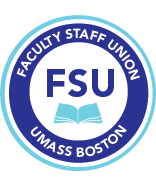The Point: Minding the Gap
9/27/2021
This week The Point was written by Professor Linda Ai-Yun Liu, a lecturer in the Sociology Department and NTT representative on the FSU Executive Committee
Dear FSU Members,
Against the persistent backdrop of rising Delta infections, struggles over class modalities, and widespread confusion over virus-exposure protocols, a tragic story managed to penetrate the fog of worry earlier this month. On the afternoon of Saturday, September 11, the lifeless body of Professor David K. Jones was found beneath a condemned rusted-out staircase at the JFK/UMass T-station. A large gap in the staircase where six steps were missing yawned about 20 feet above the ground where Dr. Jones was discovered. According to his wife, he had gone out for a run that morning and never returned. He was a 40-year-old professor of public health at Boston University and is survived by his wife and their three children. I can only imagine their suffering and sadness, and am sure that I’m not the only one haunted by his sudden and tragic end, right in our UMB backyard.
The circumstances here hit a bit too close to home. Like many UMass Boston faculty, staff, and students, I’ve traversed the stairs and platforms of JFK/UMass station countless times as part of my commute. According to State Police, the staircase Dr. Jones apparently fell from had been closed and fenced off to the public for 20 months. Previously, it had connected Old Colony Avenue and Columbia Road, allowing people to bypass the adjacent, often traffic-jammed Kosciuszko Circle (a.k.a. the “rotary from hell”), which has been characterized as life-endangering to cross for pedestrians. The gap in said staircase was even documented in a viral photo posted two years ago on Reddit (back when it was ‘only’ missing three steps). “I would always be concerned to go up these stair[s] at JFK station and tell my wife how they would just fall apart someday,” wrote the user. “It finally happened, haven’t heard of anyone getting hurt though.” I wonder what it actually took—just how many footsteps, complaints, and close calls had to occur for the staircase to be closed to the public 20 months ago?
During the last 20 months, of course, the Covid-19 pandemic upended life and understandably put a halt to many construction projects (except for the ones making our campus incredibly noisy and difficult to traverse). But it still kind of boggles my mind that a crumbling staircase with a hole of such magnitude was left to stand at a busy T-station (fence notwithstanding) where shuttles directly serve UMass Boston commuters. JFK/UMass station is a major transit hub situated at the juncture of Dorchester and South Boston that connects the Ashmont and Braintree Red Line routes, serves as a stop for four buses, and houses a separate commuter rail platform. Built in 1927 and with its last renovation dating back to 1988, the station is long overdue for rehabilitation. (Would such a hazardous staircase be allowed to stand at the Harvard Red Line station?) I can’t help but worry what other stairs and surfaces in the station—or others nearby serving our campus—are near collapse, especially with the returned foot traffic from in-person classes.
A few days after the discovery of Dr. Jones’s body, workers were seen enhancing the fencing around the hazardous staircase, presumably making it harder to trespass. The following week, after much public outcry and numerous media stories, the staircase was finally taken down. Perhaps, the lessons to be drawn from this tragedy are too obvious to bear mentioning, but then again, with the way public sector (under)funding has been going in this city and state, I’m not so sure. Putting up fences is only a temporary stopgap for a much bigger problem; so many of our public institutions today need actual funding, fixing, and restructuring. In the near future, I hope that FSU members will join our union’s efforts (through MTA and also the new national coalition Higher Ed Labor United (HELU)) to fight for that funding, at both the state and federal level. We must not wait for the next nearby tragedy to get to work on making our campus and community infrastructure safe and reliable for the people who come through every day.
This is your union. Please let us know at fsu@umb.edu what infrastructure issues, on and around campus, concern you most.
Linda Liu
Lecturer
Sociology
FSU Executive Committee NTT Representative
For information on the FSU, links to our contract and bargaining updates, and a calendar of events, see the FSU webpage
